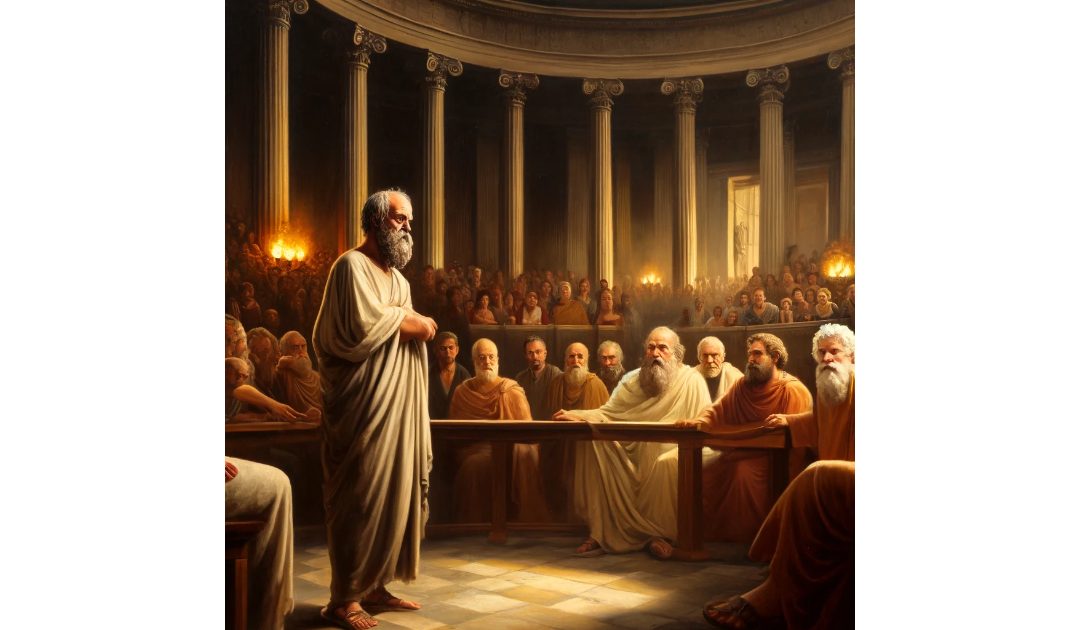On the 15th February 399 B.C. Socrates was sentenced to death by the city of Athens. I thought I had already posted about Socrates, but I appear to mistaken. I have posted on philosophy, but Socrates did not get the attention he deserves.
Socrates (469 – 399 B.C.) was a classical Greek philosopher from Athens, widely regarded as one of the founders of Western philosophy. His influence on philosophy, ethics, and epistemology has been profound, shaping the intellectual traditions of both ancient and modern thought. Unlike other philosophers of his time, Socrates did not leave behind any written works; his ideas are primarily known through the writings of his students, especially Plato and Xenophon.
Socrates was unique in his approach to philosophy. Rather than lecturing or writing treatises, he engaged in dialogue with fellow Athenians, questioning their beliefs and challenging them to think critically. This method, known as the Socratic Method, involved asking a series of questions to expose contradictions in a person’s thoughts, ultimately leading them to a clearer understanding of the topic. His philosophy revolved around the pursuit of wisdom, virtue, and self-examination. He famously stated, “The unexamined life is not worth living.”
Socrates was particularly concerned with moral and ethical issues, advocating for justice, self-discipline, and the idea that knowledge leads to virtue. He believed that true wisdom was recognizing one’s own ignorance. Unlike the Sophists, who were paid teachers of rhetoric and often sought personal gain, Socrates did not charge fees and claimed that his only motivation was the pursuit of truth.
Socrates lived during a turbulent period in Athenian history. The city-state had just suffered a devastating defeat in the Peloponnesian War (431 – 404 B.C.) against Sparta, leading to political instability. Athens saw a brief rule by the oligarchic Thirty Tyrants, followed by the restoration of democracy. During this time, many Athenians viewed Socrates with suspicion because some of his students, such as Critias and Alcibiades, were associated with anti-democratic movements.
Socrates’ habit of questioning authority and exposing ignorance among prominent citizens made him unpopular among Athenian leaders. Many saw him as a corrupting influence on the youth and a threat to traditional beliefs. His philosophical inquiries often undermined the political and religious institutions of Athens, leading to resentment from those in power.
In 399 B.C., Socrates was put on trial, accused of two main charges:
1. Corrupting the youth of Athens – His method of questioning and encouraging critical thinking allegedly led young Athenians to challenge traditional authority and values.
2. Impiety (not believing in the gods of Athens and introducing new deities). While Socrates never denied the existence of gods outright, his views on divinity were unconventional. He often spoke of an inner divine voice (a “daimonion”) that guided him, which some interpreted as introducing new religious beliefs.
The trial was highly political, as Socrates’ associations with controversial figures and his opposition to Athenian democracy contributed to his prosecution. The jury, composed of 501 Athenian citizens, found him guilty by a narrow margin. After being convicted, Socrates was given an opportunity to propose an alternative punishment. Instead of pleading for mercy, he sarcastically suggested he should be rewarded with free meals for his service to Athens. This response angered the jury, leading them to impose the death penalty.
Socrates was sentenced to death by drinking a cup of poison hemlock, a common execution method in Athens. He was given the chance to escape, as his friends had arranged for his departure, but he refused. He believed it would be unjust to violate the laws of Athens, even if they had wronged him.
Plato’s dialogue, “Phaedo”, provides a detailed account of Socrates’ final moments. Surrounded by his students, including Plato’s protagonist Phaedo, Socrates remained calm and composed, engaging in a philosophical discussion about the immortality of the soul. He argued that death should not be feared, as it was either a peaceful sleep or a transition to another realm where he could continue his pursuit of wisdom.
When the time came, Socrates drank the poison without hesitation. As the effects took hold, he continued conversing until he could no longer speak. His last words were reportedly addressed to his friend Crito: “Crito, we owe a cock to Asclepius; pay it and do not forget.” This statement likely signified that death was a form of healing or liberation from the physical world.
Socrates’ execution marked a pivotal moment in history. His trial and death became a symbol of the conflict between free thought and state power. His ideas survived through the works of his students, especially Plato, who used Socrates as a central figure in many dialogues. Socrates’ influence extended to Aristotle, who further developed his ideas and shaped Western philosophy.
His willingness to die for his principles inspired generations of thinkers, including figures in the Enlightenment, modern philosophy, and political theory. Socrates remains a timeless symbol of intellectual integrity, moral courage, and the pursuit of truth.

